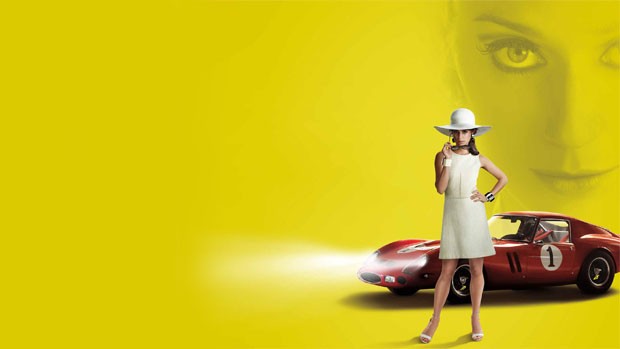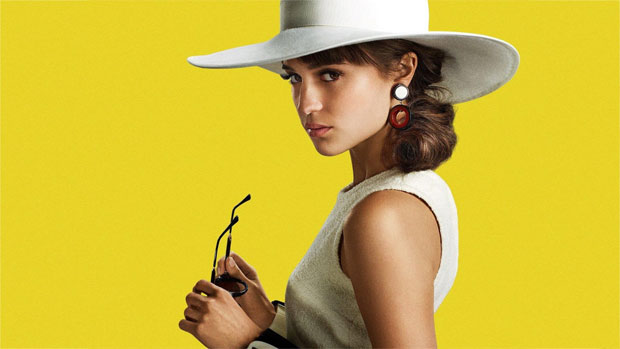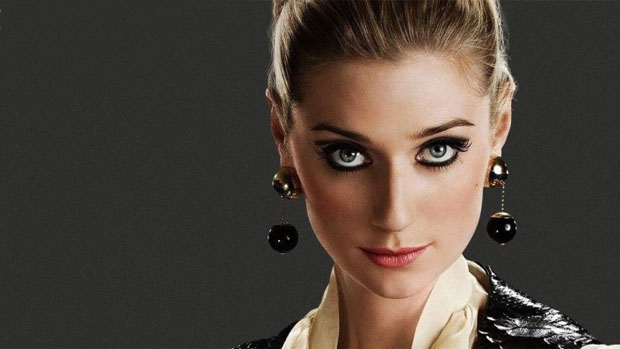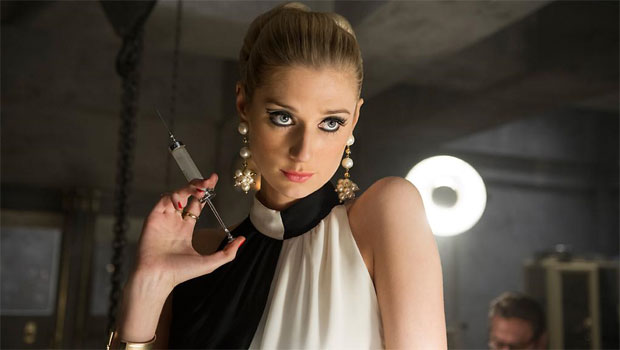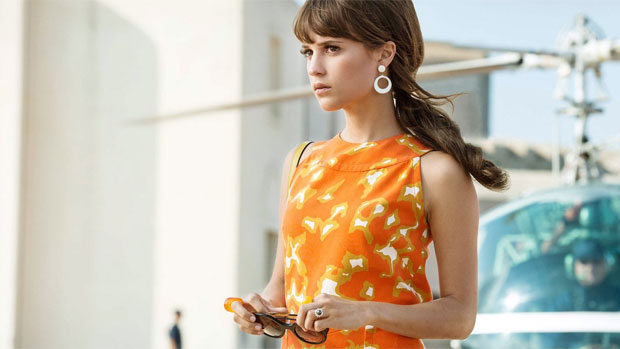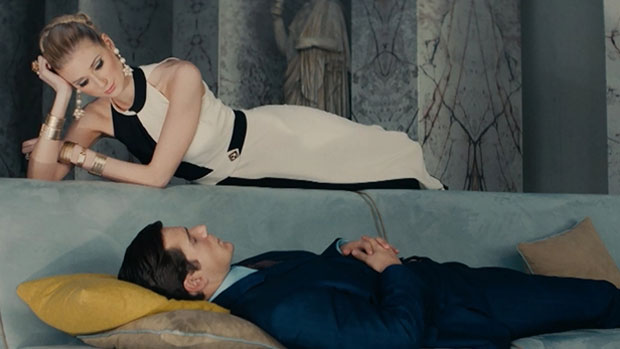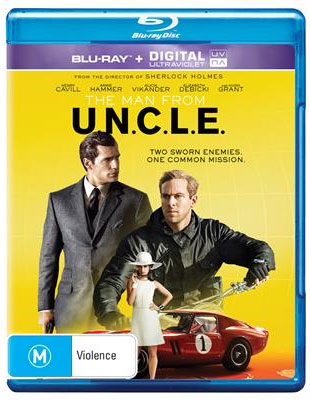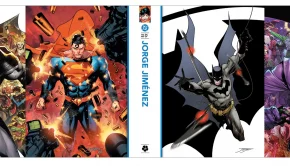ALICIA VIKANDER (Gaby Teller) & ELIZABETH DEBICKI (Victoria Vinciguerra) Interview (U.N.C.L.E.)
ALICIA VIKANDER (Gaby Teller) & ELIZABETH DEBICKI (Victoria Vinciguerra) Q&A
You are probably both too young to have watched the 1960s TV series that inspired The Man from U.N.C.L.E., but did you have any reference for what it was or were there any aspects of it that you wanted to pay homage to?
ALICIA VIKANDER: We all were quite aware that this was going to be quite a different animal from the old series, and still paying, of course, homage to it. You want everybody who comes in with their own reference and memories of the series to feel like we’ve treasured this with delicacy, and that we really give privilege to the series that it was.
I had some reference of watching the series on British television, actually, when I grew up. My dad used to watch it and I kind of peeked over his shoulder, and saw a few episodes. But then I took the decision not to watch it before we started to shoot this. I’ve done other films and there’s been the reference to maybe an adaptation of the film being done before, and it’s always nice to keep your head clear. Also, neither of our characters were in the TV series, and we knew that Napoleon Solo [Henry Cavill] and Illya Kuryakin [Armie Hammer] were going to be quite different in this film, too.
So I would love to see the series now, after you’ve kind of done the thing. I’m really curious to see what the similarities and differences are.
This movie looks like it was so much fun to make. What was it like on set for the four of you in the core cast?
ELIZABETH DEBICKI: For me, it was a different experience from what it was like on-set to what it was like off-set. Off-set, we had a marvelous time together. We were in these fabulous locations, and we had so much fun together, actually. It was such a pleasure. It’s often that when you start a job, where you’re working on something, your social life kind of disappears.
ALICIA VIKANDER: It’s very anti-social.
ELIZABETH DEBICKI: The opposite, really.
And here, you’ve all become friends.
ALICIA VIKANDER: Yeah. We went out each night to different restaurants. We had an Italian, Luca Calvani, in the cast. We made a list of things that we just ticked off each day, restaurants and places to see.
ELIZABETH DEBICKI: It was so lovely. And, now, it’s actually just so lovely to see everybody again. Most of my scenes are with Henry. But being the villain, it’s a slightly anti-social thing, and I felt very, very much in a bubble – my own evil bubble.
I also spent a lot of the time, weirdly, on my own. Perhaps it was a reflection of what it was like, psychologically, to play Victoria. I felt very removed, so my experience on-set was different, too. Alicia had many scenes with Henry and Armie, and they had to function together in order to obtain the thing they were trying to do. Victoria is really on her own little nasty tangents, and I felt very much removed from people.
There are two strong female characters in this film, which is not so typical in movies of this genre. Can you talk about working with [co-writer/director/producer] Guy Ritchie and his approach to your characters?
ALICIA VIKANDER: I don’t think that Elizabeth or I, when we read the script, said, ‘Oh, this is a strong female character.’ It was like, ‘Oh, these are just great parts.’ But it’s interesting that so many journalists want to talk about having two strong female characters in a film. We saw old films, and there are a lot of strong female actresses from that time. But, sadly enough, especially in this genre, it isn’t really representative.
ELIZABETH DEBICKI: Well, they so often become the literal sidekick or the beauty – not necessarily beauty and brains, and all those things put together. But I think that it’s a credit to Guy and [producer/co-writer] Lionel Wigram for writing these characters. I mean, we picked up the script, and they just existed, whereas so often you read a script as an actress, and you think, ‘Okay, but what can I do to layer this?’ Or, ‘I need to find complexity in this.’
And having a villainess – it is unusual. Everybody’s trying to foil [Victoria’s] plans, and she’s the main source of the evil. And then you have Gaby, and what’s so great about her is her ambiguity. She’s so fiercely independent. You don’t know when she’s lying or where her loyalties lie. And that’s so refreshing.
Alicia, what did you like most about your character when you read the script?
ALICIA VIKANDER: Well, I think it was that thing of finding a very strong, fierce female character. Also, because of the ambiguity that Elizabeth mentioned, I knew that I was stepping into a film where people would have their idea of what role I had in this story, and then that role flips quite a few times throughout the film. And then I had never done a comedy or an action movie, and I got to do both here. And I’m a big fan of Guy Ritchie’s previous work. I think I was very curious about his very specific sort of black humor and his style and the ease to his films, and how he manages to get that performance out of his actors.
My character goes on quite a journey. She’s a girl who’s brought up behind the [Berlin] Wall, and she has never experienced any of that kind of ‘60s style revolution herself. So she goes on that journey, experiencing that in this film.
There are some major chase sequences in this film. Is it true that you couldn’t drive?
ALICIA VIKANDER: No. None of us had a driver’s license.
What was the most challenging in terms of the action for you?
ALICIA VIKANDER: We both actually come from a physical background. We danced, and so I really enjoy the physical aspects of any character that I take on. And then doing action – a high level of action – you get to try things that you wouldn’t ever normally do. To be in a harness and throw yourself off of a building was just a lot of fun.
I don’t even drive a car myself, but to sit behind a steering wheel and then actually pull all the wires through the car, and there’s a [stunt driver] in this tiny cage – it’s a funny picture, and I think I still have it on my computer. He actually drove the car for me. But people asked me after the first take, ‘How are you? Are you fine? Was it scary?’ I hadn’t even thought of the fact that I was in the car. So, actually, it was quite dangerous, all those little alleys. But, yeah, I just had so much fun. I really enjoyed it.
Is there a particular reason why neither of you drive?
ELIZABETH DEBICKI: We’re both completely impractical human beings.
ALICIA VIKANDER: Yeah. [Laughs]
So you are very green?
ELIZABETH DEBICKI: Yeah, we’ve very, very eco-friendly. [Laughs]
I think that it’s so bizarre, this phenomenon. I’ve noted it throughout my life – so many actors don’t drive cars. I grew up in Melbourne, Australia, and you use public transport everywhere. I was really young in high school, so when all my friends were getting their licenses, I couldn’t apply for it. I sort of missed the boat and never got on it. And then I just went to university and always took public transport. So that’s my excuse. I will one day get my driver’s license. I can drive a car, but you don’t want to be in it with me or even on the road. [Laughs]
But everyone keeps asking about stunts, and I didn’t really get any. Taking off in a manual car, for me, was a really huge life achievement. When I got it, and it went in a straight line, I was like, ‘Yes!’ It was such a private joy for me.
Your character always looks like she’s flipping through Vanity Fair a few minutes before she’s going to take over the world.
ELIZABETH DEBICKI: She is.
Out of the big spy movies, was there any particular film that inspired or influenced you as you shaped Victoria?
ELIZABETH DEBICKI: I don’t know if there was a specific one. I didn’t watch that many spy films in reference to this. I’ve watched some Fellini films. I watched some De Niro films. I watched Belle de Jour. I also watched The Tenth Victim, and it’s the most unusual but fantastic film. It’s futuristic, and they run around with these big guns, and she’s got this bra on. It is kind of slightly strange and absurd. I did watch a lot of that school of Italian ‘60s cinema. I felt like that influenced me the most because as much as I did watch spy films, and watched the villains of those films, I felt like we were really creating something new.
ALICIA VIKANDER: We—without giving too much away—don’t really play spies. I think it’s more the kind of women that you’ve seen in older cinema. We all knew that it was going to be very different. Guy is so precious. He wants everyone to prepare for when you get on-set. He really just wants you to drop everything you have. ‘We have those things, so let’s find new things.’ That was a mantra that we had on-set.
ELIZABETH DEBICKI: We don’t want to label her, but Victoria is sort of a psychopath. I mean, she lacks empathy, let’s be honest. [Laughs] I think that there’s also this slightly sadistic enjoyment she gets out of what she does, and that she works the best when she’s really enjoying what she’s doing there. I think that that’s fun to watch.
So Guy kind of set up an environment for me as an actor. He just wanted me to feel free, enjoy the monologue, enjoy the lines, and have her private enjoyment of the torturing she does of these poor souls. I did really enjoy playing her, and Guy really let me do that.
ALICIA VIKANDER: I love that she ends up being such a self-made woman.
ELIZABETH DEBICKI: She’s building an enterprise. So she’ll just step over dead bodies to get there. [Laughs] But like any business person, when she achieves something in a business sense, she pats herself on the back and is just sort of, ‘Onwards, it’s business.’ I always imagined her waking up and putting on her face.
ALICIA VIKANDER: She doesn’t even take it off when she goes to bed. I love that. I saw that scene, and I was thinking, ‘I love that she still has the hair and makeup on.’
ELIZABETH DEBICKI: Yeah. [Laughs] I begged Guy. I had this crazy idea that I wanted a scene where she went to bed, and we saw her face on the stand – like, she takes it off and puts it on the thing. But that was just slightly too far. I mean, it would have taken it to a completely different direction. We would have had, like, serious questions about her as a human. But that was sort of in the back of my mind.
I just had this idea that she was so self-made and so self-aware; she knew exactly the image she was projecting, and it was completely curated and created. I think there is a precision about her. So, therefore, when she does achieve something in that business sense, she just enjoys it.
So are some of the things that really stand out for you about this film that were different from your other experiences?
ALICIA VIKANDER: I stepped into this film knowing and excited about seeing Guy Ritchie’s distinct style, but it was more in the way that he worked. He’s very collaborative, and very at ease, but in your head it was hard to imagine how it would all come together. That is something that I think is very specific to what he does. I was almost thinking, ‘Oh, I totally get how you work on precisely creating each of those characters.’ It’s more about the human, and because of the subject, too, of this film, which needs to be taken seriously. Whilst it being a very humorous film in the end, he embraces it with such delicacy.
Then when you see the film, and the way he’s cut it all together, and the way he adds on his music and the tempo… I love how he surprises you, like using very chill Italian elevator music while there are images everywhere. You’re just on a ride. Even though I had an idea, and hoped it’s going to be like that on this film, it’s a different thing when you spend months and months of filming things. I was thinking, ‘Oh, yeah, there it is. He did it.’
You’ve both done period dramas and other kinds of movies. Do you have an ideal type of project you’d like to tackle next?
ALICIA VIKANDER: Something that I have no idea what it is. It’s going to surprise me, and be so different from anything I’ve done. That’s probably going to make me the most excited.
ELIZABETH DEBICKI: For me, you have a vague idea. But, actually, it’s really difficult to say because you never really know what you need to do as an actor. I’ve had this funny feeling that things find you, and it’s what you should be doing at that moment as an artist in your life. Something falls into your lap, and it’s not what you expected. And it challenges you more than something else might. You just try it out, and you’re scared of it. And that’s the kind of role that I think we both look for all the time.
The Man from U.N.C.L.E. available on Blu-ray & DVD 16 December 2015


